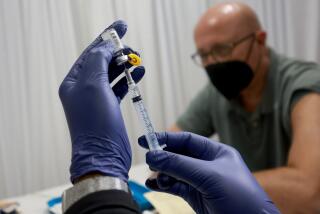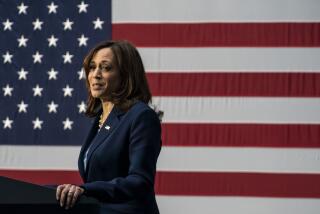Facing its first Ebola test, New York acts quickly and aggressively
- Share via
Reporting from New York — City officials here had long worried that a patient infected with Ebola would eventually appear somewhere in this dense, bustling and chaotic city.
It could quickly become a public health disaster in a place where strangers huddle together on subway cars and pedestrians jostle for space on crowded sidewalks.
The city of 8.3 million people got its first test this week when a doctor who had been treating Ebola patients in the West African nation of Guinea tested positive for the virus after returning to New York and coming down with a fever of 100.3.
In the wake of the confusion and missteps that surrounded the first U.S. Ebola diagnoses in Dallas last month, public health officials in New York were ready.
The afflicted physician, Craig Allen Spencer, was whisked into isolation, his fiancee and friends were clamped into quarantine, and his apartment was sealed and decontaminated by a biohazard crew.
New York and New Jersey announced mandatory quarantines for anyone traveling from three West African nations who has had direct contact with an Ebola patient, including healthcare workers.
“This is too serious a situation to leave it to the honor system of compliance,” said New York Gov. Andrew M. Cuomo.
City officials said weeks of drills and lessons after the Dallas cases helped ensure a rapid response here, from the moment Spencer called the aid group Doctors Without Borders, with whom he volunteered in Guinea, on Thursday morning to report that he had a fever.
New York Mayor Bill de Blasio and Dr. Mary Bassett, the city’s health commissioner, assured New Yorkers that Spencer did not become symptomatic until Thursday morning and that he was not contagious during his outings earlier in the week.
“This was a doctor. He was taking his temperature twice a day. He knew he was only contagious if he was symptomatic,” Cuomo said.
Neighbors gathered outside Spencer’s Harlem apartment building, where crews sealed the apartment and handed out Ebola information fliers in English and Spanish.
Cleaners wearing protective suits and boots carried blue plastic waste-collecting drums into the apartment to begin the hours-long decontamination process.
Pedro Vanegas, 45, who lives and works across the street from the apartment building, said he was not worried.
“The truth is that I was surprised and worried when I found out last night,” Vanegas said. “But I think the government is doing the best they can. They started cleaning the apartment immediately.”
Many others were not reassured. Some echoed lawmakers’ calls in Washington for a ban on people arriving from West Africa, where Ebola is suspected in more than 4,800 deaths.
“I don’t like the idea that the country is letting people come and go from these West African countries like normal,” said Kenneth Clarke, 45, who lives in the neighborhood. “How many more people like him are walking around?”
Juan Perez, 21, whose family lives down the block, said his parents had not sent his younger sister to her school across the street out of fear she could catch Ebola.
“Everybody is scared,” said Perez. He said he wished local officials would hand out more information on Ebola prevention methods.
“And masks,” Perez added. “I wish they would give people face masks.”
Spencer had been treating Ebola patients in Guinea. He left the African nation on Oct. 14 and arrived back in New York on Oct. 17.
The aid group alerted city health officials to Spencer’s fever. The health department sent emergency medical services workers in full protective gear to Spencer’s apartment.
“The process played out exactly as the protocol dictated,” De Blasio said at a news conference, repeatedly reminding New Yorkers that Ebola is spread through direct contact with bodily fluids and is not airborne.
“We have the finest public health system … anywhere in the world. It is ready for extraordinary challenges,” he said. “We are fully prepared to handle Ebola.”
To underscore his assertion that New Yorkers have nothing to worry about, De Blasio sent a Twitter photograph of himself riding a crowded subway car.
He and Bassett said they had confidence in the self-monitoring system recommended by the Centers for Disease Control and Prevention for people returning from Ebola-hit areas. It advises them to isolate themselves for 21 days, Ebola’s incubation period, and to take their temperatures twice daily.
But Cuomo and New Jersey Gov. Chris Christie said later that the newest developments showed that voluntary self-isolation did not work. From now on, they said, healthcare workers and others who had direct contact with Ebola patients in West Africa will be required to spend 21 days in quarantine.
Officials at Newark Liberty International Airport in New Jersey and John F. Kennedy International Airport in New York also will conduct interviews with other passengers coming from Guinea, Liberia and Sierra Leone and decide whether there is reason to impose mandatory quarantines on them.
Both said the New York case and the situation of an NBC-TV crew that violated voluntary quarantine after returning from covering the Ebola crisis in West Africa showed that the CDC’s system did not work.
“He’s a doctor,” Cuomo said of Spencer, and even he didn’t follow the guidelines for the quarantine. “Let’s be honest. So we have to do more.”
“We are no longer relying on CDC standards,” said Christie. “There are now New York-New Jersey standards on this.”
It was not immediately clear how the mandatory quarantine would be enforced, but in New York
City, officials said they had placed Spencer’s fiancee and two close friends under mandatory quarantine, which included sending health officials to them each day to take their temperatures.
In addition, Bassett said that from now on, other people arriving in the city from the Ebola-afflicted region would be contacted by health officials each day and asked for their temperatures.
None of Spencer’s three close contacts in New York has showed signs of illness, and health workers who swooped down on a coffee kiosk and a bowling alley that he visited on Wednesday declared them at no risk of contamination.
In Bethesda, Md., Dallas nurse Nina Pham, who contracted the virus while treating a Liberian man who died of the disease, was released from the National Institutes of Health Clinic after being declared free of Ebola.
“I feel fortunate and blessed to be standing here today,” said Pham, who added that she was looking forward to going back to Dallas and being reunited with her friends, family and her dog, Bentley.
Still hospitalized with Ebola is Pham’s colleague, nurse Amber Vinson, who was also exposed while treating the Liberian patient, Thomas Eric Duncan. Duncan died Oct. 8.
Emory University Hospital in Atlanta said Friday that a blood test had showed Vinson’s blood was clear of Ebola, but it did not say when she might be released.
tina.susman@latimes.com
alexandra.zavis@latimes.com
Times staff writer Susman and special correspondent Srikrishnan reported from New York and Times staff writer Zavis from Los Angeles. Times staff writer Evan Halper in Washington contributed to this report.
More to Read
Sign up for Essential California
The most important California stories and recommendations in your inbox every morning.
You may occasionally receive promotional content from the Los Angeles Times.














